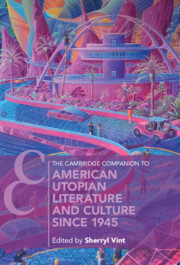Book contents
- The Cambridge Companion to American Utopian Literature and Culture since 1945
- The Cambridge Companion to American Utopian Literature and Culture since 1945
- Copyright page
- Contents
- Figures
- Contributors
- Introduction
- Chapter 1 Pandemics and the Lesson of History
- Chapter 2 American Futures
- Chapter 3 Engendering Utopia
- Chapter 4 America and/as White Supremacy
- Chapter 5 American Spirituality
- Chapter 6 Black Escapes and Black Wishlands
- Chapter 7 Latinx Belonging in New World Borders
- Chapter 8 Educating Desire
- Chapter 9 Utopia after American Hegemony
- Chapter 10 Technological Fantasies
- Chapter 11 Utopian Spaces
- Chapter 12 Environmentalism and Ecotopias
- Chapter 13 Economic Justice
- Chapter 14 Renewing Democracy
- Chapter 15 The Time of New Histories
- Works Cited
- Index
- Cambridge Companions To Literature
Chapter 10 - Technological Fantasies
Published online by Cambridge University Press: 09 May 2024
- The Cambridge Companion to American Utopian Literature and Culture since 1945
- The Cambridge Companion to American Utopian Literature and Culture since 1945
- Copyright page
- Contents
- Figures
- Contributors
- Introduction
- Chapter 1 Pandemics and the Lesson of History
- Chapter 2 American Futures
- Chapter 3 Engendering Utopia
- Chapter 4 America and/as White Supremacy
- Chapter 5 American Spirituality
- Chapter 6 Black Escapes and Black Wishlands
- Chapter 7 Latinx Belonging in New World Borders
- Chapter 8 Educating Desire
- Chapter 9 Utopia after American Hegemony
- Chapter 10 Technological Fantasies
- Chapter 11 Utopian Spaces
- Chapter 12 Environmentalism and Ecotopias
- Chapter 13 Economic Justice
- Chapter 14 Renewing Democracy
- Chapter 15 The Time of New Histories
- Works Cited
- Index
- Cambridge Companions To Literature
Summary
Technology has served a recurrent role as a utopian imaginary for speculative fiction writers and consumers. As a utopian promise, technology appears to provide individuals, communities, and whole societies with the means to overcome nature – whether it is base human natures, relationships with one’s environment, or the perceived limitations of one’s body. This chapter focuses on two similar technological fantasies, James Cameron’s Terminator films and Martha Wells’ Murderbot series. In both series, central figures – namely the T-800 played by Arnold Schwarzenegger and Murderbot – approximate being human but are limited by their technological being. Yet, in being not-fully-human, they expose how technology always serves as a false utopian promise: there is no way out of our humanness through technology. In this way, technological fantasies serve as a form of horror, at once tempting readers with possibilities, but revealing those possibilities to be empty – or malignant.
- Type
- Chapter
- Information
- Publisher: Cambridge University PressPrint publication year: 2024

